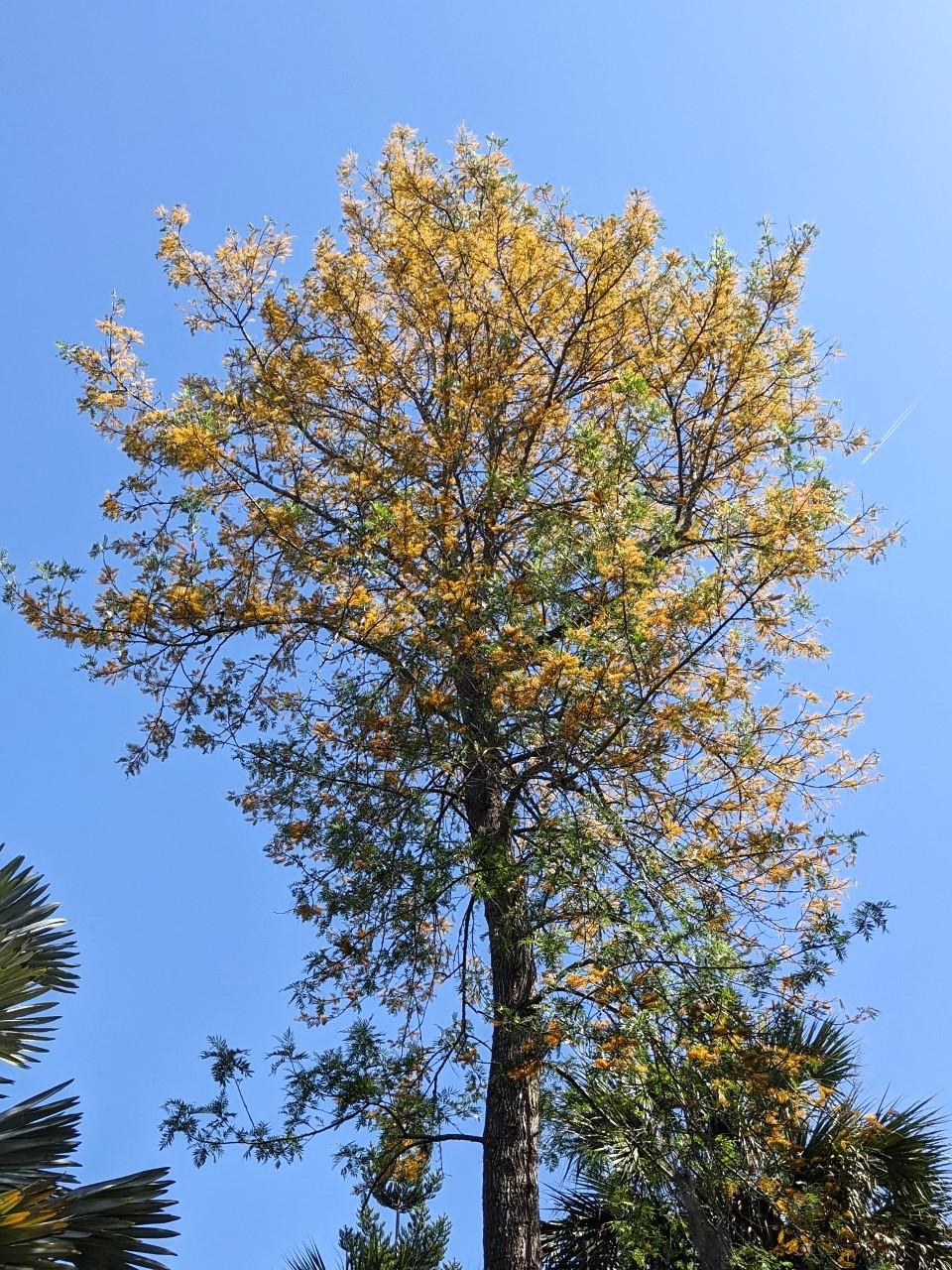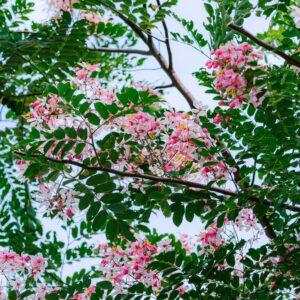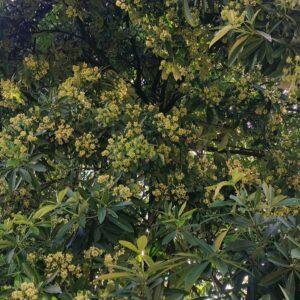Grevillea Tree“🌺🌳 The Flame of the Garden
The Grevillea Tree is a fast-growing, flowering evergreen native to Australia, and known for its exotic spider-like blooms, fern-like foliage, and year-round visual interest. With over 350 species, including shrubs and trees, the most common tree form is Grevillea robusta, also called the Silky Oak — a majestic species that can reach up to 20–30 meters and is widely grown across Asia, Africa, and the Americas.
The Grevillea is a gardener’s dream: fast-growing, drought-tolerant, pest-resistant, and a magnet for birds — all while offering a tropical-to-wild aesthetic with low effort.
🌿 Botanical Overview
Botanical name: Grevillea robusta (most common tree form)
Common names: Grevillea Tree, Silky Oak, Silver Oak
Family: Proteaceae
Type: Flowering evergreen tree
Height: 10–30 meters (can be pruned to maintain smaller size)
Canopy Spread: 5–10 meters
Leaves: Deeply cut, fern-like, silvery underneath
Flowers: Bright orange-golden, toothbrush-shaped or spider-like clusters
Bloom time: Late spring to early summer (some species bloom year-round)
Growth rate: Fast
☀️ Climate & Sunlight Needs
Sunlight:
Thrives in full sun (minimum 6–8 hours daily)
Tolerates partial shade but blooms best in bright exposure
Temperature:
Optimal: 15–35°C (60–95°F)
USDA Zones: 9–11
Frost-tolerant once mature, but young plants need protection from freezing
☀️ In tropical or subtropical gardens, Grevillea is a low-fuss choice with maximum bloom.
🌱 Soil Requirements
Type:
Prefers well-drained, sandy or loamy soil
Tolerates poor, rocky, or slightly acidic soils
Drainage:
Essential — waterlogged soil leads to root rot
Avoid heavy clay unless amended
pH: Slightly acidic (5.5 to 6.5)
🌿 Add compost and coarse sand to improve soil texture before planting.
💧 Watering Routine
Young trees:
Water deeply 2–3 times a week until established
Keep soil lightly moist, not soggy
Mature trees:
Very drought-tolerant
Water once every 7–10 days during prolonged dry spells
Withstand short dry periods with ease
⚠️ Do not overwater — root rot is the only serious threat.
🌾 Fertilization
Grevilleas are low nutrient-demand plants, but still benefit from occasional feeding:
Type: Use low-phosphorus fertilizer (phosphorus harms native Proteaceae roots)
When:
Apply in early spring and early summer
Optionally apply compost or seaweed extract monthly during bloom season
🧪 Look for labels that say “”safe for native plants”” or “”P-free””.
✂️ Pruning & Maintenance
Routine pruning:
Light prune after flowering to shape the tree
Remove dead or crossing branches
Cut back height for hedge use or compact shape
Hard pruning: Tolerated well, even to rejuvenate an older tree
🪓 Keep interior open to allow air and light to reach all parts.
🌿 Propagation
Seeds:
Soak seeds 24 hours before sowing
Germinate in warm, well-draining soil mix
May take 2–4 weeks to sprout
Cuttings:
Semi-hardwood cuttings in summer
Use rooting hormone for faster success
🌱 Grafted hybrids are also available for specific flower colors and compact growth.
🐛 Pests and Diseases
Pests: Generally pest-free, but may attract:
Aphids
Scale insects (especially in humid areas)
Caterpillars or leaf miners
Diseases:
Root rot from poor drainage
Sooty mold (secondary to sap-sucking insects)
🛡️ Neem oil or horticultural soap works well for pests. Ensure good airflow and dry soil base.
🏡 Landscaping and Ornamental Use
Design ideas:
Feature tree in lawns or gardens
Bird garden tree (attracts sunbirds, hummingbirds, bees)
Hedges or windbreaks (if pruned)
Ideal in xeriscaping, coastal gardens, and wildlife-friendly landscapes
Companions: Looks great with kangaroo paw, lavender, succulents, bottlebrush, and grasses
📸 Its showy blooms and soft, feathery foliage create movement and contrast in any garden.
✅ Conclusion
The Grevillea Tree is a perfect combination of beauty, biodiversity, and ease. Whether you’re seeking a pollinator magnet, a flowering screen, or a sculptural garden tree, Grevillea offers long-lasting color, low water needs, and minimal care. With the right sun and soil, it will reward you with gorgeous flowers and buzzing life year after year.”





Reviews
There are no reviews yet.